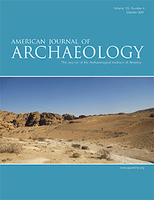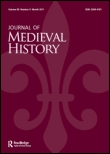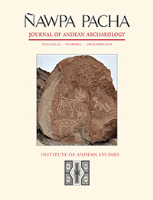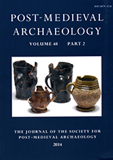
Archaeology Ethnology and Anthropology of Eurasia
Scope & Guideline
Illuminating the Cultural Mosaic of Eurasia
Introduction
Aims and Scopes
- Interdisciplinary Research:
The journal promotes interdisciplinary studies that combine archaeology, anthropology, and ethnology to provide a holistic understanding of Eurasian cultures. - Cultural Heritage and Identity:
A significant focus is placed on the exploration of cultural heritage and identity among various ethnic groups in Eurasia, examining how historical narratives shape contemporary identities. - Technological Advances in Archaeology:
The journal frequently publishes research that incorporates modern technological methods such as geophysical surveys, isotopic analysis, and multispectral imaging to enhance archaeological findings. - Chronological and Contextual Studies:
Studies that delve into the chronological frameworks and contextual analyses of archaeological sites, artifacts, and cultural practices are central to the journal's scope. - Human-Animal Relationships:
Research on the relationships between humans and animals, including domestication, subsistence strategies, and ritual practices, is a recurring theme. - Paleolithic to Medieval Transitions:
The journal covers a wide temporal range from the Paleolithic to medieval periods, analyzing socio-economic and cultural transitions across different epochs.
Trending and Emerging
- Paleogenetics and Migration Studies:
There is a growing interest in paleogenetic research and its implications for understanding human migration patterns across Eurasia, reflecting advances in genetic analysis technologies. - Cultural Resilience and Adaptation:
Studies examining how communities adapt and maintain cultural practices in the face of environmental and social changes are increasingly prominent, emphasizing resilience. - Material Culture and Technological Innovation:
An emerging focus on the analysis of material culture, particularly technological innovations in ancient societies, is evident, exploring how these innovations influenced social structures. - Environmental Archaeology:
Research in environmental archaeology is on the rise, with a focus on how past human activities have shaped and interacted with their environments, addressing themes like climate change and resource management. - Public Archaeology and Community Engagement:
There is an increasing trend towards public archaeology, emphasizing the importance of community engagement and the dissemination of archaeological knowledge to the public.
Declining or Waning
- Traditional Ethnographic Studies:
There has been a noticeable decline in papers focused solely on traditional ethnographic studies, as the journal increasingly emphasizes interdisciplinary approaches that integrate archaeological and anthropological perspectives. - Focus on Isolated Cultures:
Research concentrating on isolated or singular cultural narratives has waned, with a growing preference for studies that address broader cultural interactions and connections between Eurasian societies. - Narrow Regional Studies:
Papers that focus on very specific regional studies without broader implications or connections to wider Eurasian contexts are becoming less common. - Historical Archaeology of Recent Centuries:
Attention to historical archaeology pertaining to the last few centuries has decreased, with more emphasis being placed on prehistoric and early historic periods.
Similar Journals

Studia Ethnologica Croatica
Unlocking the Rich Tapestry of Ethnological ResearchStudia Ethnologica Croatica is a distinguished open-access journal dedicated to the fields of ethnology and cultural anthropology, published by the University of Zagreb's Faculty of Humanities and Social Sciences. Since its inception in 1989, the journal has provided a platform for scholarly discourse and critical analysis of cultural practices, social structures, and ethnographic research pertinent to Croatia and beyond. With an impressive Q2 ranking in Cultural Studies and a strengthening presence in Anthropology (Q3), the journal is essential for researchers and practitioners alike, contributing significantly to ongoing discussions within these disciplines. Recognized on Scopus with notable rankings, it represents a valuable resource for those seeking to deepen their understanding of contemporary ethnological issues. The journal operates under an open access model, ensuring that its high-quality research is freely accessible to a global audience, thereby fostering collaboration and inspiring new inquiries within the social sciences.

Laboratorium-Russian Review of Social Research
Fostering Critical Discussions in Social SciencesLaboratorium - Russian Review of Social Research, published by the Institute of European Russian and Eurasian Studies, is a pivotal journal that delves into the complexities of social phenomena within the Russian and Eurasian context. With its ISSN 2076-8214 and E-ISSN 2078-1938, this journal has been recognized for its significant contributions to anthropology, cultural studies, gender studies, sociology, and political science, earning a Category Quartile Q2 ranking in Anthropology and Cultural Studies in 2023. The journal provides a platform for innovative research and critical discussions that shed light on the social dynamics influencing the region, making it an essential resource for researchers, professionals, and students. Its open access approach ensures that knowledge is freely accessible, fostering a collaborative academic community. With a converged publication timeline from 2018 to 2024, Laboratorium is committed to advancing understanding and facilitating discourse in the rapidly evolving fields it covers, positioning itself as a significant player in social sciences research.

Southern African Humanities
Connecting researchers to Southern Africa's vibrant heritage.Southern African Humanities is an esteemed academic journal published by the Natal Museum, dedicated to advancing the fields of anthropology, archaeology, and cultural studies with a particular focus on the Southern African context. Since its inception in 2008, the journal has consistently provided a platform for innovative research and scholarly discourse, earning a prominent reputation with a 2023 impact factor that places it in the Q2 and Q1 quartiles across multiple relevant categories, including Anthropology, Archaeology, and History. The journal is recognized for its rigorous peer-review process and dissemination of high-caliber research, exemplified by its Scopus rankings, which reflect its widespread influence within the humanities. Although it does not currently offer open access options, the journal remains pivotal for researchers, professionals, and students aiming to deepen their understanding of Southern African cultures and historical contexts. Located in Pietermaritzburg, South Africa, Southern African Humanities continues to be an essential resource for those engaged in the humanities, enhancing knowledge and fostering research collaborations within the region and beyond.

AMERICAN JOURNAL OF ARCHAEOLOGY
Advancing Archaeological Knowledge and InsightThe American Journal of Archaeology (ISSN: 0002-9114, E-ISSN: 1939-828X), published by the esteemed University of Chicago Press, stands as a leading scholarly journal in the field of archaeology, celebrated for its rigorous peer-reviewed research. With an impressive impact factor that places it in the Q1 quartile for both archaeology and archaeology within the arts and humanities, this journal ranks among the top 15% in its field, according to Scopus metrics. It serves a global audience of researchers, professionals, and students, facilitating the dissemination of innovative findings from excavations, historical analyses, and methodological advancements. While primarily available through subscription, the journal's archives and features provide invaluable resources for deepening one's understanding of the past and engaging with current archaeological discourse. Operating from its home in Chicago, USA, the American Journal of Archaeology actively contributes to the advancement of knowledge and scholarship in archaeology, making it an essential platform for those invested in the exploration of ancient civilizations and cultural heritage.

Interdisciplinaria Archaeologica-Natural Sciences in Archaeology
Transforming Discoveries with a Scientific ApproachInterdisciplinaria Archaeologica-Natural Sciences in Archaeology is a distinguished journal published by UNIV HRADEC KRALOVE, dedicated to the exploration and integration of natural sciences within the context of archaeology. With an impact factor that reflects its strong footing in the academic community, this journal provides a vital platform for interdisciplinary research, fostering collaboration among archaeologists, scientists, and scholars from diverse fields. Since its transition to Open Access in 2010, it has made significant contributions to the accessibility of research findings, connecting global audiences interested in the archaeological sciences. Based in the Czech Republic, the journal has achieved impressive rankings—placing in the Q2 quartile across both Archaeology and Arts and Humanities categories, as well as respectable standings in the Social Sciences domain. Over its converged years from 2014 to 2024, it has published cutting-edge studies that enhance our understanding of past human behaviors through scientific methodologies. Researchers, professionals, and students are encouraged to engage with the journal’s content to contribute to and benefit from the vibrant discourse in archaeological science.

JOURNAL OF MEDIEVAL HISTORY
Transforming Understanding of the Middle AgesJOURNAL OF MEDIEVAL HISTORY, published by Routledge Journals, Taylor & Francis Ltd, stands as a vital resource in the field of historical studies, focusing on the complex tapestry of the medieval period from 1975 to 2024. With an ISSN of 0304-4181 and E-ISSN of 1873-1279, this journal boasts an impressive Q2 categorization in History, ranking #502 out of 1760 in the Scopus Arts and Humanities rankings, placing it in the top 29% of its field. The journal aims to publish high-quality, innovative research that enhances the understanding of medieval history, making it an indispensable read for scholars, practitioners, and students alike. While it does not currently offer Open Access options, its reputable standing ensures that it reaches a wide audience dedicated to exploring the intricacies of the medieval era. Engage with cutting-edge scholarship and historical insights that collectively contribute to the advancement of medieval studies.

PROCEEDINGS OF THE ROYAL IRISH ACADEMY SECTION C-ARCHAEOLOGY CELTIC STUDIES HISTORY LINGUISTICS LITERATURE
Fostering Dialogue in Literature and LinguisticsPROCEEDINGS OF THE ROYAL IRISH ACADEMY SECTION C - ARCHAEOLOGY, CELTIC STUDIES, HISTORY, LINGUISTICS, LITERATURE is a distinguished academic journal published by the Royal Irish Academy, based in Dublin, Ireland. With a focus that spans vital areas of research including archaeology, Celtic studies, history, linguistics, and literature, this journal plays a crucial role in the dissemination of scholarly work that enriches our understanding of these interconnected fields. The journal holds an impressive standing in academia, featuring prominently in several Scopus categories, with a Q1 ranking in Literature and Literary Theory, highlighting its significant impact and relevance. Although currently not open access, it assures potential readers of the rigor and quality upheld in its publications through selective peer-review processes. This journal serves as an essential resource for researchers, professionals, and students alike, eager to engage with innovative studies and discussions that underpin Ireland's cultural and historical heritage.

Nawpa Pacha
Advancing the Frontiers of Archaeological Inquiry.Nawpa Pacha, a prestigious journal published by Taylor & Francis Ltd, stands as a significant platform for advancing research in Archaeology within the fields of Arts and Humanities. Since its inception in 2019, it has rapidly established itself with an impressive impact, evidenced by its categorization in the Q1 quartile for Archaeology and its significant rankings—placing it at Rank #88 in the Arts and Humanities category and Rank #86 in the Social Sciences. Published in the United Kingdom, the journal aims to foster interdisciplinary dialogue and promote scholarly work that contributes to the understanding of archaeological heritage and practices. Researchers, professionals, and students alike will find this journal indispensable for disseminating innovative methodologies, theoretical frameworks, and case studies that push the boundaries of archaeological inquiry. Whether seeking to explore historical narratives or contemporary archaeological challenges, Nawpa Pacha serves as a vital resource in the ever-evolving landscape of archaeological research.

Post-Medieval Archaeology
Fostering Scholarly Dialogue on Archaeological DiscoveriesPost-Medieval Archaeology is a distinguished academic journal published by ROUTLEDGE JOURNALS, TAYLOR & FRANCIS LTD, focusing on the rich tapestry of human history from the post-medieval period through the lens of archaeology. With a proud publication history spanning since 1967, this journal addresses the integration of archaeological findings with historical narratives, contributing significantly to the field of archaeology and history. The journal holds an impressive categorization within the Q2 and Q3 quartiles for Archaeology and History in 2023, showcasing its commitment to academic excellence and relevance within these disciplines. Researchers and professionals alike will find value in its critical examinations and innovative methodologies that illuminate the past, making it a pivotal resource for those engaged in archaeological research. As an essential platform for scholarly debate and dissemination, Post-Medieval Archaeology continues to advance the understanding of post-medieval contexts and material culture, fostering discussions that resonate through various areas of the arts, humanities, and social sciences.

Cahiers Mondes Anciens
Democratizing Access to Ancient WisdomCahiers Mondes Anciens is a distinguished Open Access journal dedicated to advancing the field of ancient studies, encompassing a wide array of disciplines such as archaeology, history, and cultural heritage. Published by CAHIERS MONDES ANCIENS, based in Paris, this journal has been providing seamless access to groundbreaking research since its inception in 2010, embodying a commitment to democratizing knowledge within the academic community. With an ISSN of 2107-0199, Cahiers Mondes Anciens offers a platform for researchers and scholars to share innovative findings, critical analyses, and interdisciplinary approaches that enrich our understanding of the ancient world. The journal is renowned for its rigorous peer-review process, ensuring the highest standards of scholarship. By fostering a vibrant community of academics, it plays a crucial role in the ongoing discourse surrounding ancient civilizations, making it an essential resource for professionals, students, and enthusiasts alike.